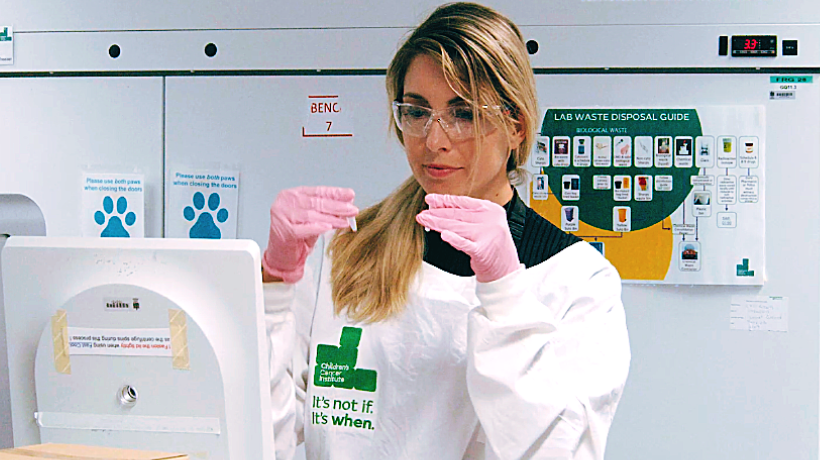Modernising sarcoma therapies: Right treatment, right time

The Kids’ Cancer Project is funding powerful research by Dr Emmy Fleuren at the Children’s Cancer Institute. She’s bringing sarcoma treatment into the future.
How is it that your own body’s cells can suddenly turn against you? What drives them to change from keeping you healthy to making you sick without being influenced by a viral infection or some other foreign cause?
These questions and more have always fascinated Dr Emmy Fleuren, now a Senior Scientist at the Children’s Cancer Institute and a recipient of a grant from The Kids’ Cancer Project.
Originally from the Netherlands, where she studied Biomedical Sciences, Emmy’s work has since revolved around children’s cancer research.
I was always fascinated by what it is that makes these particular cells, which are still your own cells, so different from others.
- Dr Emmy Fleuren
I had always had a general interest in cancer. When I started my PhD in 2010, my focus was on finding better treatments for young Ewing sarcoma patients. I started working closely with a clinician and got to meet some of her patients so I could learn more about what these patients actually go through.
I was in my early 20s at the time, and one girl I got to know, who was my age, had a Ewing sarcoma. She had short hair and was missing a foot, but otherwise looked completely healthy. She had a lot of different treatments and still she passed away.
It was clear from then on, Emmy says, that she wanted to focus on research into cancers in young people.
The problem with Ewing sarcoma, she says, is that treatments have remained relatively unchanged for decades. While some cancers, such as leukaemia, have experienced leaps and bounds forward in treatment protocols, others have stalled.
The thing people don’t understand with sarcomas is that for each subtype on their own, yes, they are rare. But collectively, they make up around 10 percent of all childhood cancers.
- Dr Emmy Fleuren
Identifying the right sarcoma at the right time
Emmy was recruited into the Children’s Cancer Institute almost three years ago to set up the sarcoma research capability.
She was attracted to the Children’s Cancer Institute because of its Precision Medicine Program for childhood cancer.
In the past, children in Australia with cancer, children that had a very poor prognosis, could be enrolled into this program,” she explains. “It meant their doctors sent a piece of the tumour to us at the Children’s Cancer Institute and we did a molecular profile.
Researchers investigated everything they could, including in the DNA of the patient, to see if there was something that could be acted upon.
One of the most powerful processes involved growing the patient’s own cells in the laboratory then, in real time, trying up to 160 different drugs to see which had a positive effect.
That was already happening when I arrived and there were quite a lot of sarcoma patients in there.
We had all of this unique data that nobody else in the world had about these sarcoma patients.
- Dr Emmy Fleuren
The research Emmy is conducting now involves identifying the right treatment at the right time for individual patients.
The change that’s happening right now is that every childhood cancer patient, no matter what stage of the disease, can be enrolled. This means we’re not just looking at the poor-prognosis patients, and it also means we can receive samples from patients much earlier in their cancer journey.

Importantly, we can now look at activation patterns across many different disease stages and see if there is something different happening that we can act upon. Perhaps there is a new drug now in clinical trial, something like that.
If we can find something earlier, we might not have to wait until the patient has had chemotherapy or surgery. We could help the patient avoid some of the negative side-effects of usual treatments.
- Dr Emmy Fleuren
Closing the gap in sarcoma treatment
Although she’s been doing vital work in kids’ cancer research for over a decade, Emmy is still considered an early to mid-career researcher. At this stage of career, she says, it is extremely difficult to find funding.
It’s also very difficult to find funding for rare cancers. That is something I’ve struggled with since I started working on these tumours – finding ways to get the funds for the research that you want to do.
When I started, for example, there were a number of major, breast cancer grants going out, but nothing for sarcomas. In grant applications, you’re asked how many patients your work might benefit. If it benefits more patients, you’ll likely be better funded.
Help The Kids' Cancer Project continue to support bold researchers like Dr Emmy Fleuren, who are investigating innovative treatments for childhood cancer.

